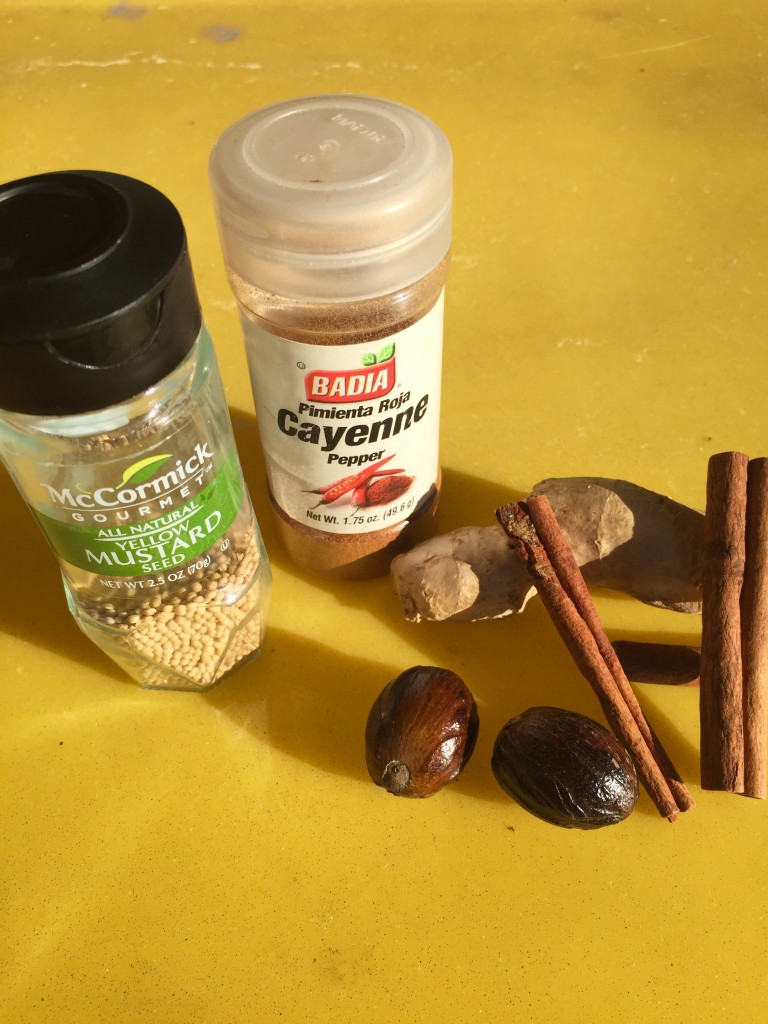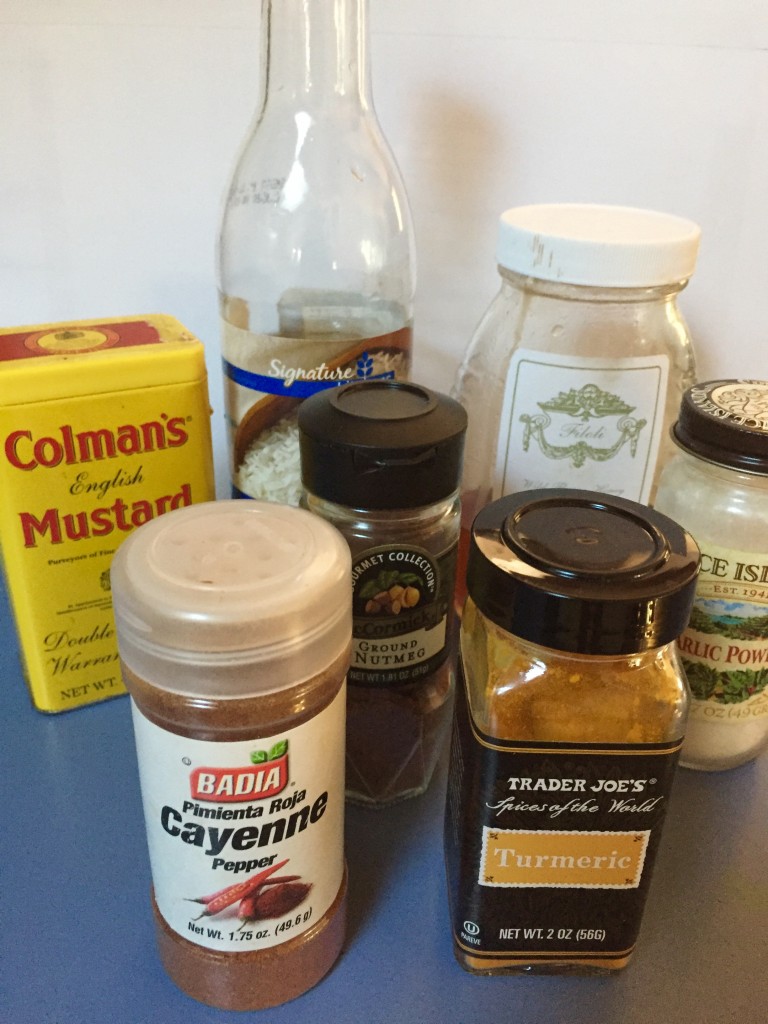11 Spices to Boost your Health and a Secret Recipe for a Spicy Salad Dressing
Spices are a common part of all cultural culinary preparation. While spices are often added to each dish in small amounts in comparison to many other ingredients, they are one of the most power-packed ingredients in a meal. Spices are loaded with powerful antioxidants that serve to protect your body from environmental compounds so that you can stay healthy and energized. Listed below are 11 of the most common spices that can enhance your health.

Nutmeg
Throughout ancient times, Roman and Greek civilizations utilized nutmeg like a brain tonic. Nutmeg contains the essential oils myristicin and macelignan. These compounds have been shown to improve cognitive function and decrease the degredation of neural pathways. Known for its ability to detoxify the body, nutmeg can help cleanse the liver and kidney. The ancient Chinese utilized nutmeg oil as a balm for muscle pain, joint pain and other inflammatory processes that produce pain in the body. Nutmeg has anti-bacterial qualities so can help with gum problems and toothaches and is found as an ingredient in many toothpastes. Nutmeg can be used as a digestive aid if you suffer from stomachaches, bloating, and gas. Nutmeg is a spice that you can add to any cleanse, power drink, coffee and even your tea. Sipping on some nutmeg tea before bed can help increase your body’s ability to calm down for a good night sleep, due to high concentration of magnesium.
Cayenne Pepper
The primary ingredient in cayenne pepper is capsaicin, which is a compound that has been known to fight fat storage in the body to help you lose weight. The main mechanism of action for the fat burning properties of capsaicin is an increased thermic effect A positive thermic effect can burn calories, shred fat, and help you to lose weight. Consider adding a dash of cayenne pepper to a refreshing smoothie or cleanse beverage as well as adding to your favorite BBQ sauce, stir fry, chili recipe or anything you want to jazz up a bit. Beware…a little goes a long way.
Ginseng
Both American Ginseng (Panax quinquefolius, L.) and Asian Ginseng (P. Ginseng) are believed to provide an energy boost, lower blood sugar and cholesterol levels, reduce stress, promote relaxation, treat diabetes, and treat sexual dysfunction in men. Ginseng is a common ingredient, or spice, that is added to many healthy beverages and energy drinks. Ginseng is considered an adaptogen that can help aid with energy. In addition, ginseng is commonly found in green teas, which can be widely credited with the energy boosting properties you get from a fresh cup of green tea. If you are looking to boost your energy levels and burn more energy throughout the day, consider adding ginseng to your daily consumption, with green tea being the best source that you can select.
Cinnamon
Once upon a time, cinnamon was more valuable than gold. The potential health benefits of cinnamon could be stated as nothing short of astonishing. While it’s true that there’s no cure for Type 2 diabetes, cinnamon can be an effective tool in managing the disease. Add to this the fact that cinnamon has a naturally sweet taste that is devoid of sugar it as a staple for the pantries of those with Type 2 diabetes. Cinnamon also raises HDL (the “good”) cholesterol. Cinnamon has been proven to fight fungal, bacterial, and viral elements in foods, thus preventing spoilage. It’s no surprise that in the Middle Ages, when food spoilage was far more frequent due to lack of refrigeration, many recipes, both sweet and savory, were flavored with cinnamon. Cinnamon has been shown to help neurons and improve motor function in those suffering from Alzheimer’s or Parkinson’s. Cinnamon has anti-inflammatory features and can help treat certain types of pain and headaches, as well as arthritis pain. It plays a double role in this particular type of pain because cinnamon can also boost circulation
Ginger
Considered more of a root vegetable, ginger makes a fine addition to any meal, thus making this an important spice. Ginger can be used fresh, dried, powdered, or as an oil or juice, and is sometimes added to processed foods and cosmetics. It is a very common ingredient in recipes. The unique fragrance and flavor of ginger come from its natural oils, the most important of which is ginger. Gingerol is the main bioactive compound in ginger, responsible for much of its medicinal properties. It has powerful anti-inflammatory and antioxidant effects. In addition the amazing taste of ginger, it has numerous health benefits including motion sickness, stomach upset, sore throats, and bloating. Ginger appears to be highly effective against nausea. For example, it has a long history of use as a sea sickness remedy, and there is some evidence that it may be as effective as prescription medication. Ginger may also relieve nausea and vomiting after surgery, and in cancer patients undergoing chemotherapy, but it may be the most effective when it comes to pregnancy-related nausea, such as morning sickness. Consider grating some fresh ginger on some of your main dishes or cut up some ginger into cubes and add it to boiling water for refreshing tea. If you are prone to upset stomach following a meal, consider adding more ginger in your meals to help ease your stomach.
Anise Seed
This is a spice that has a taste that is similar to black licorice. The seeds are an excellent source of minerals like iron, magnesium, calcium, manganese, zinc, potassium and copper. These minerals are essential to cardiac, bone and blood health and are needed by the body to turn food into energy. The B-complex vitamins found in aniseed are essential to overall health. Loaded with riboflavin, pyridoxine, niacin and thiamin, the seeds can contribute to healthy levels of neuro-chemicals in the brain. Anise seeds help to ease your upset stomach symptoms, and can help relieve your cough and dripping nose as well. For the women, anise seeds can help to improve milk supply during breastfeeding.
Oregano
Oregano is a common spice in many Italian dishes and it has been associated with many health benefits. Oregano contains high amounts of Omega-3s, Iron, Manganese, and antioxidants. Oregano has one of the highest levels of antioxidants found in any spice or food. Ounce-for-ounce, oregano has shown 42 times more antioxidant activity than apples, 12 times more than oranges, and 4 times more than blueberries. Oregano Essential Oil is well known in natural health communities for its antibacterial properties. Oregano oil is good for relieving any type of inflammation, internal or external, and can offer relief from allergies. Oregano oil promotes digestion and relieves congestion and pain, without side effects.
Sage
If you are looking for a spice that can help with your memory, pain relief, and sore throat issues, then sage is your spice. Sage can be effective in alleviating sore throat symptoms that you may get due to a cold virus. Sage improves and boosts the memory of an individual and proves to be an excellent herb for children. The herb is rich in vitamin A and calcium, which are extremely important for the growth of teeth, bones and skin. The anti- microbial properties present in sage help in the treatment of fungal and microbial infections. The herb is extensively used in the healing process of surgical incisions, wounds and sores, as an antiseptic. The oil extracted from sage contains camphor and camphen, which prevent and cure fungal infections such as dermatitis, athlete’s foot and other skin diseases and infections. Sage helps with allergies and mosquito bites. It packs many powerful antioxidants within itself, which protects cells from forming cancerous cells or getting damaged by oxidation. The cicatrisant present in sage is used in skin care creams and anti-marks cosmetics; a fortunate thing for cosmetic industry. The herb helps in the digestion of fatty foods that are difficult to digest and protein rich.
Parsley
The health benefits of parsley include controlling cancer, diabetes, and rheumatoid arthritis, along with helping prevent osteoporosis. Furthermore, it acts as a pain reliever with anti-inflammatory properties. It also provides relief from gastrointestinal issues such as indigestion, stomach cramps, bloating, and nausea, while helping to strengthen the immune system. This is one of the most versatile spices available. You can keep a supply of dried parsley in your spice cabinet or buy is fresh at the store or grow it in your herb garden. Known for having a wonderful taste, parsley is great for healing and protecting the body. A one-half cup of parsley offers five times your daily requirements for vitamin k, which is a vitamin needed for proper blood clotting. Parsley also offers a good supply of vitamin C and vitamin A, both are potent antioxidants needed for skin and eye health. Parsley has been associated with a reduction of cancer and the prevention of tumor growth as well.
Mustard Seeds
The easiest way to incorporate mustard seeds into your diet is in a mustard spread or in the dry powder form, the popular yellow condiment used on hamburgers, hot dogs, deli sandwiches and found in salad dressings and sauces. Mustard comes in many varieties and in addition to tasting delicious, mustard offers anti-inflammatory properties that can help reduce the pain and inflammation associated with certain forms of arthritis and other inflammatory process based diseases. Mustard is high in selenium, manganese, and even omega-3 fatty acids. All of these nutrients contribute anti-inflammatory benefits in the body.
Tumeric
Turmeric has been used for over 2500 years in India. The health benefits of turmeric have been slowly revealing themselves over the centuries. Over the years, researchers have been learning more and more about the health benefits of turmeric and its active component, curcumin. Long known for its anti-inflammatory properties, recent research has revealed that it can be helpful in the treatment of many different health conditions from cancer to Alzheimer’s disease. Tumeric also helps fight against obesity and its related symptoms. Curcumin reduces leptin resistance, lowers insulin resistance, reverses hyperglycemia, reduces inflammation, and activates fat burning gene signals. Tumeric has also been shown to help with stomach problems, sleep problems and may help in the treatment of depression.
Here is a power packed anti-inflammatory dressing for your favorite Chinese Chicken Salad recipe. This is full of unusual spices that will boost your health and wellness.

Anti-inflammatory Dressing for Chinese Chicken Salad
¾ cup rice wine vinegar
¼ cup olive oil or sesame oil
1 inch fresh ginger grated
¼ teaspoon cayenne pepper (less if you prefer)
¼ teaspoon dry mustard
¼ teaspoon tumeric
½ teaspoon nutmeg
¼ teaspoon garlic powder or 1 fresh clove garlic
½ teaspoon honey
Stir all together or shake in a dressing bottle. Adjust seasonings to your taste. Pour onto a big bowl of mixed together-shredded carrots, cabbage, broccoli slaw, celery sliced thin, Persian cucumbers sliced thin and sliced water chesnuts. Add your favorite protein-shredded chicken, steamed or quickly fried tofu. Toss with dressing and add a handful of raw sunflower seeds. Enjoy!!!

- ¾ cup rice wine vinegar
- ¼ cup olive oil or sesame oil
- 1 inch fresh ginger grated
- ¼ teaspoon cayenne pepper (less if you prefer)
- ¼ teaspoon dry mustard
- ¼ teaspoon tumeric
- ½ teaspoon nutmeg
- ¼ teaspoon garlic powder or 1 fresh clove garlic
- ½ teaspoon honey
- Stir all together or shake in a dressing bottle.
- Adjust seasonings to your taste.
- Pour onto a big bowl of mixed together-shredded carrots, cabbage, broccoli slaw, celery sliced thin, Persian cucumbers sliced thin and sliced water chestnuts.
- Add your favorite protein-shredded chicken, steamed or quickly fried tofu.
- Toss with dressing and add a handful of raw sunflower seeds. Enjoy!!!
What is your favorite way to incorporate healthy spices into your family’s diet?
